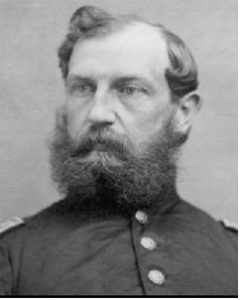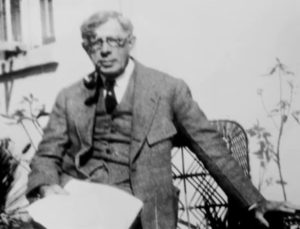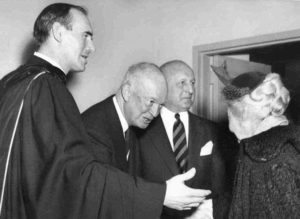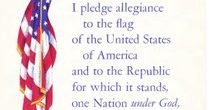The Pledge of Allegiance has an interesting history and has gone through several revisions before its final rendition in 1954 which we continue to recite today. The phrase “under God” has clarified our unity as a nation and is consistent with our history. This phrase has kept us from the dangerous trend toward nationalism on one hand (my country right or wrong) and secularism on the other (having no declaration of God’s sovereignty over the nation at all).
Many may not realize that the original Pledge did not have the phrase “under God” within it. But did you know that the addition of this critical phrase came from a sermon? Let’s rehearse the rest of the story.
 Colonel George Balch, a veteran of the Civil War, wrote the original version of the first Pledge of Allegiance in 1887. It stated; “We give our heads and hearts to God and our country; one country, one language, one flag!” He encourages young people to give their hearts and heads first to God, then their country. The emphasis on one country, language and flag is a cry for unity at the close of the war. Balch’s pledge was embraced by the Daughters of the American Revolution and the Grand Army of the Republic, but not nationally recognized or officially recommended by Congress.
Colonel George Balch, a veteran of the Civil War, wrote the original version of the first Pledge of Allegiance in 1887. It stated; “We give our heads and hearts to God and our country; one country, one language, one flag!” He encourages young people to give their hearts and heads first to God, then their country. The emphasis on one country, language and flag is a cry for unity at the close of the war. Balch’s pledge was embraced by the Daughters of the American Revolution and the Grand Army of the Republic, but not nationally recognized or officially recommended by Congress.
 Francis Bellamy, a “Christian” socialist and Baptist minister, did not like Colonel Balch’s pledge. He wrote that the text was “too juvenile and lacking in dignity.” His pledge was published in the popular children’s magazine The Youth’s Companion as a part of the 400th anniversary of Columbus Day. Bellamy wanted it, as a socialist, to emphasize the ideals of the French Revolution; liberty, equality and fraternity. However, he knew that the average school teacher would not go for such radical ideas of external equality enforced by government. Thus, he chose words that would declare allegiance to “the form of government chosen by the founding fathers and established by the Revolution.” His rendition was proclaimed by President Harrison to be used on October 12, 1892 at the Chicago World’s Fair. It was recited as “I pledge allegiance to my Flag and the Republic for which it stands, one nation, indivisible, with liberty and justice for all.”
Francis Bellamy, a “Christian” socialist and Baptist minister, did not like Colonel Balch’s pledge. He wrote that the text was “too juvenile and lacking in dignity.” His pledge was published in the popular children’s magazine The Youth’s Companion as a part of the 400th anniversary of Columbus Day. Bellamy wanted it, as a socialist, to emphasize the ideals of the French Revolution; liberty, equality and fraternity. However, he knew that the average school teacher would not go for such radical ideas of external equality enforced by government. Thus, he chose words that would declare allegiance to “the form of government chosen by the founding fathers and established by the Revolution.” His rendition was proclaimed by President Harrison to be used on October 12, 1892 at the Chicago World’s Fair. It was recited as “I pledge allegiance to my Flag and the Republic for which it stands, one nation, indivisible, with liberty and justice for all.”
Southern States were not happy with the word “indivisible” for it seemed to eliminate all State’s Rights, and several organizations, including the Daughters of the American Revolution, were concerned that Bellamy’s Pledge made no mention of allegiance to God. The DAR tried to merge the “old Pledge” (Balch) with Bellamy’s “new Pledge” but it did not catch on nationally. After the 1923 National Flag Conference, further changes were made, and finally Congress recognized the Pledge for the first time on June 22, 1942 as: “I Pledge allegiance to the flag of the United States of America, and to the Republic for which it stands, one Nation indivisible, with liberty and justice for all.”
An attorney from Illinois, Louis Bowman, was the first to officially initiate the addition of “under God.” The National Society of the Daughters of the American Revolution gave him an Award of Merit for this and he also served as Chaplain of the Illinois Society of the Sons of the American Revolution. Several organizations, both Catholic and Protestant, began to spontaneously add the phrase “under God.” President Truman was encouraged by Holgar Christian Langmack, an originator of the National Prayer Breakfast, to add the phrase in 1952, but to no avail.
 On February 7, 1954, New York Avenue Presbyterian Church honored Abraham Lincoln’s birthday with a special service, and President Eisenhower sat in Lincoln’s pew. Rev. Dr. George MacPherson Docherty used the opportunity of preaching a sermon, commemorating the Gettysburg Address to explain why the phrase “under God” should be added to the Pledge of Allegiance. The title of his message was “A New Birth of Freedom.” He spoke of the freedom each American takes for granted, and then asked simply, “And where did all this come from?” He then spoke these words:
On February 7, 1954, New York Avenue Presbyterian Church honored Abraham Lincoln’s birthday with a special service, and President Eisenhower sat in Lincoln’s pew. Rev. Dr. George MacPherson Docherty used the opportunity of preaching a sermon, commemorating the Gettysburg Address to explain why the phrase “under God” should be added to the Pledge of Allegiance. The title of his message was “A New Birth of Freedom.” He spoke of the freedom each American takes for granted, and then asked simply, “And where did all this come from?” He then spoke these words:
These fundamental concepts of life had been given to the world from Sinai, where the moral law was graven upon tables of stone, symbolizing the universal application to all men; and they came from the New Testament, where they heard in the words of Jesus of Nazareth the living Word of God for the world. This is the American way of life… Lincoln saw this clearly… Wherefore, he claims that it is under God that this Nation shall know a new birth of freedom. By implication, it is under God that ‘government of the people, by the people, and for the people shall not perish from the earth’…
Rev. Docherty then recalled how his children came home from school and recited the new Pledge of Allegiance that they had just repeated in school. He then said,
There was something missing in this pledge, and that which was missing was the characteristic and definitive factor in the American way of life. Indeed, apart from the mention of the phrase, the United States of America, this could be a pledge of any republic…. What, therefore, is missing in the pledge of allegiance that Americans have been saying off and on since 1892, and officially since 1942? The one fundamental concept that completely and ultimately separates Communist Russian from the democratic institutions of this country…
 We face today, a theological war… It is a fight for the freedom of the human personality. It is not simply man’s inhumanity to man. It is Armageddon, a battle of the gods. It is the view of man as it comes down to us from Judeo-Christian civilization in mortal combat against modern, secularized, godless humanity. The pledge of allegiance seems to me to omit this theological implication that is fundamental to the American way of life. It should be “one nation, indivisible, under God.”
We face today, a theological war… It is a fight for the freedom of the human personality. It is not simply man’s inhumanity to man. It is Armageddon, a battle of the gods. It is the view of man as it comes down to us from Judeo-Christian civilization in mortal combat against modern, secularized, godless humanity. The pledge of allegiance seems to me to omit this theological implication that is fundamental to the American way of life. It should be “one nation, indivisible, under God.”
President Eisenhower agreed and signed legislation into law on June 14, 1954 – on Flag Day. He said,
From this day forward, the millions of our school children will daily proclaim in every city and town, every village and rural school house, the dedication of our nation and our people to the Almighty… In this way we are reaffirming the transcendence of religious faith in America’s heritage and future; in this way we shall constantly strengthen those spiritual weapons which forever will be our country’s most powerful resource, in peace or in war.
The Pledge of Allegiance would be difficult to recite for a Christian if it left out God. The Scriptures are clear in this regard, for we owe our allegiance to God first, and then to the nation in which we reside. We are dual citizens, first to heaven, and then to earth. “Honor all people. Love the brotherhood. Fear God. Honor the King.” (1st Peter 2:17 – NAS)







